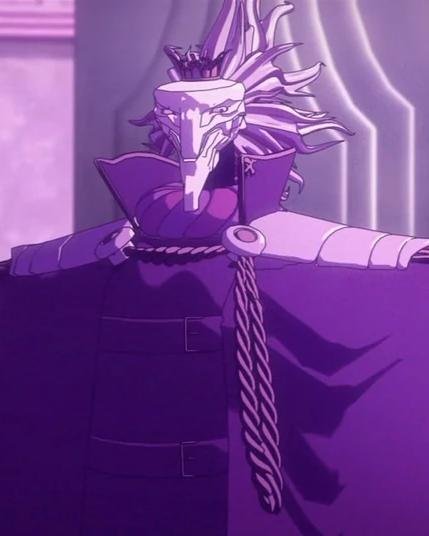
Deus Ex Machina
Deus Ex Machina |
|
|---|---|
 |
|
| Characteristics | |
| Race: |
God |
| Gender: | Male |
| Age: | 10.000+ |
| Hair Color: | White/Blue Streaks |
| Eye Color: | Black |
| Professional Information | |
| Affiliation: | Future Diary Holders
Muru Muru(Assistant) |
| Occupation: | God of Time and Space |
| Personal Status | |
| Status: | Deceased (First World and Second World)
Alive (Third World) |
| Relatives: | Aru Akise (Creation) |
| Debut | |
| Manga: | Chapter 1 |
| Anime: | Episode 1 |
| Voices | |
| Japanese: | Norio Wakamoto |
| English : | Kent Williams |
| “ | ” | |
|
— Deus Ex Machina
|
||
Appearance

Deus Ex Machina’s appearance.
Deus Ex Machina is an imposing and otherworldly entity, standing at an astounding height that surpasses a hundred feet, dwarfing the other characters in the series. His head bears a striking resemblance to the skull of an enigmatic creature, adorned with a golden crown that signifies his divine status. A cascade of white and blue hair spills from the back of his head, adding to his ethereal presence.
Deus Ex Machina is an imposing and otherworldly entity, standing at an astounding height that surpasses a hundred feet, dwarfing the other characters in the series. His head bears a striking resemblance to the skull of an enigmatic creature, adorned with a golden crown that signifies his divine status. A cascade of white and blue hair spills from the back of his head, adding to his ethereal presence.
Personality
Despite his status as a god, Deus Ex Machina is characterized by a laid-back and playful demeanor, often prioritizing his amusement alongside the fulfillment of his goals. He demonstrates a disconcerting apathy—or perhaps obliviousness—to the consequences of his “games.” In his initial appearance, he instigates a war purely for entertainment, showcasing a disregard for the dire implications of the Survival Game, which forces participants to kill one another. His selection of candidates appears based on how “interesting” they are rather than their motivations for seeking his title, leading to a pool of contenders who may harbor selfish or destructive intentions, some even aspiring to annihilate the universe.
While Deus does not outright lie, he skillfully manipulates the truth to further his objectives, such as evading Yukiteru’s inquiries about the possibility of reviving the dead. Despite these traits, Deus is not entirely devoid of compassion; he occasionally acts with genuine benevolence, such as when he saved Minene Uryuu from death and offered her a Future Diary without coercion, despite her disdain for deities.
Throughout the Survival Game, Deus exhibits a sense of honor, striving to maintain fairness. He answers participants’ questions and takes measures to ensure the integrity of the game. This includes appointing a special observer to monitor the candidates and intervene in cases of significant deviation, as well as sending Minene on a mission to confront Muru Muru, who was unfairly aiding Yuno. Notably, Deus willingly shares part of his knowledge and powers with Minene to assist her, even at the risk of hastening his own demise.
Deus also cultivates relationships with various diary holders. He harbors a fondness for Yukiteru, initially appearing as his imaginary friend and designating him as the “First” diary owner. He supports Yukiteru throughout the Survival Game, viewing his mistakes as integral to his growth as a successor.
His dynamic with Minene Uryuu is particularly unique; she openly des him yet still seeks his guidance. Despite her desire to eliminate the concept of divinity, she engages with Deus out of necessity, and he appreciates her resilience, choosing her as a key player in his plans against Muru Muru.
Additionally, Deus shares a camaraderie with John Bacchus, with whom he created the Future Diaries. Their friendship is evident in John’s request to stage the Survival Game in Sakurami City. However, John’s ambitions sometimes conflict with Deus’s needs, as he pushes for the elimination of Yukiteru and Yuno to expedite the game’s progression.
Overall, Deus Ex Machina’s interactions with various humans suggest he may possess a degree of fondness for them—particularly those he deems intriguing.
History
Deus Ex Machina is the god of time and space in Future Diary (Mirai Nikki). As he nears the end of his life and his power begins to wane, Deus realizes he will soon cease to exist, which threatens to destabilize the fabric of reality. To prevent this, he decides to find a successor by organizing a survival game.
Deus selects twelve individuals to participate in this game, granting each a “Future Diary” that can predict specific aspects of the future, depending on each person’s personality and habits. The objective of the game is to eliminate the other diary holders, with the last one standing inheriting Deus’s power and role as the new god.
Throughout the game, Deus oversees the events alongside his assistant, Murmur, rarely intervening but ensuring the game progresses toward its intended conclusion. He takes a particular interest in Yukiteru Amano, one of the participants, and allows him to develop, seeing potential for godhood in him. As the game nears its end, Deus’s strength continues to deteriorate, pushing him to accelerate the game to secure a successor before he vanishes completely.
Eventually, Yukiteru wins the game and assumes Deus’s position as the new god of time and space, fulfilling Deus’s purpose in creating the game and preserving reality after his death.